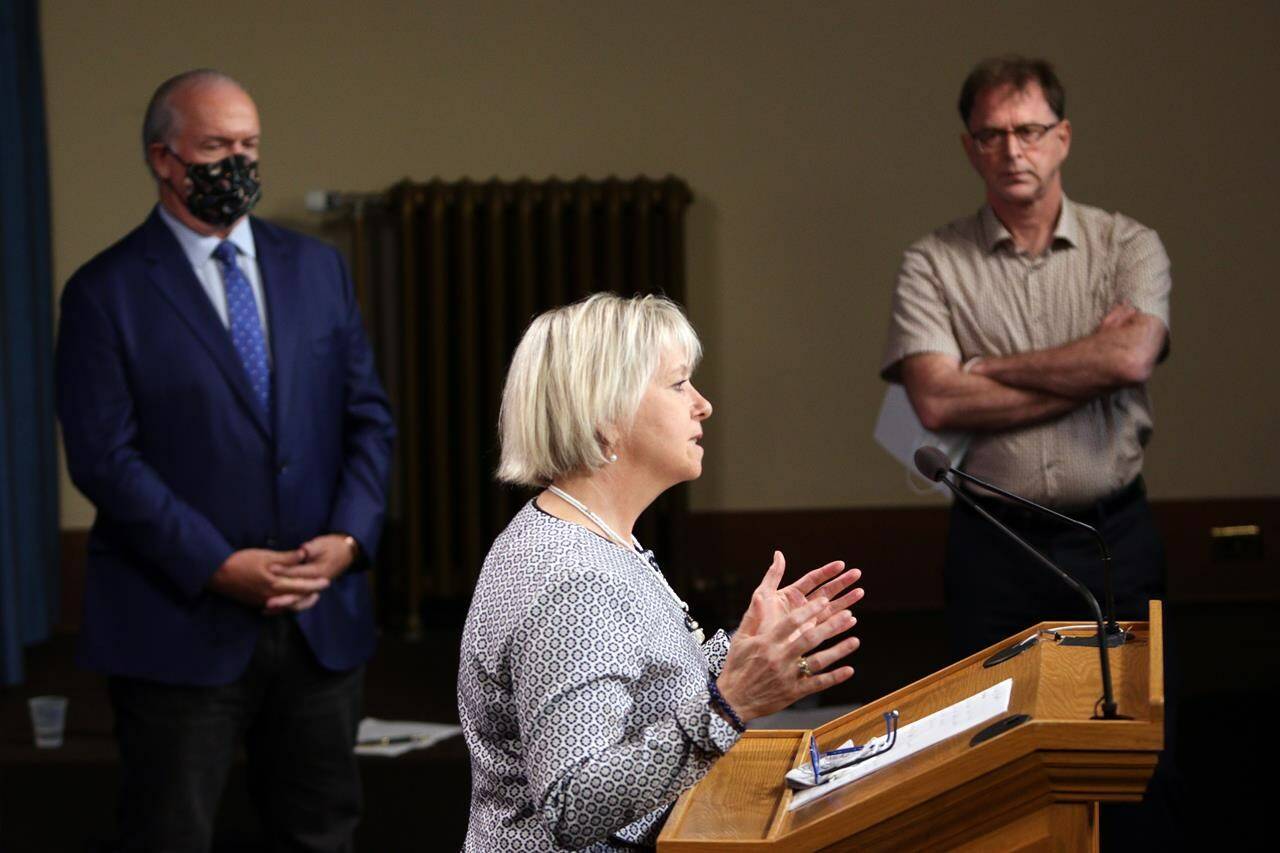British Columbia is reversing course on notifying parents about COVID-19 exposures at schools after the provincial health officer previously said reporting of single cases caused too much anxiety.
Dr. Bonnie Henry said Tuesday that parents and teachers from across the province have let it be known they need to be informed about the transmission of the virus and that a new system is expected to be in place by the end of the week.
“We have asked our team to get together right now to make sure that we can notify schools in a timely, less intrusive and more sustainable way and that parents will have access to that information rapidly,” she said.
Henry said in early September that notifications would go out only for outbreaks or clusters, prompting parents and the B.C. Teachers’ Federation to say that not having an understanding of what’s going on at schools would create more anxiety.
An online “COVID tracker” page created last year by Richmond mother Kathy Marliss includes data based on exposure and case information submitted by teachers, parents and administrators. She has said parents, teachers and students would be better served if the data came directly from the province.
Henry said parents of students who have been exposed to COVID-19 would be notified but that following up on each case could take longer than expected as public health teams prioritize schools in order to keep youth learning there.
B.C. reported 525 new cases of COVID-19 on Tuesday, moving active cases up to 5,282.
One more person has died, bringing the death toll to 1,900 since the pandemic began.
Henry also encouraged people who are pregnant, planning to get pregnant or breastfeeding to get vaccinated against COVID-19 after 40 pregnant women received intensive care in B.C. in the last few months.
While that group of people wasn’t included in clinical trials, real-life evidence shows vaccination prevents severe illness and hospitalization, Henry added.
Health-care workers, including those who are in their child-bearing years, should get vaccinated to protect themselves, their colleagues and others who may be exposed to the virus, she said.
There’s no increased risk of complications for immunized pregnant women or to their baby, and international data show no difference in the rates of miscarriage, early birth, stillbirth or other adverse effects, Henry said.
“I can unequivocally say these vaccines do not affect fertility in women, or in boys, or in young men. They do not affect fertility. There’s no way they can do that. That is one of the common lies that is out there right now, designed to create fear.”
The Delta variant has shown unvaccinated pregnant women experience higher rates of stillbirth and preterm birth, leading to their priority vaccination in many provinces.
The Society of Obstetricians and Gynecologists of Canada as well as a national vaccine advisory panel have recommended vaccines for women who are pregnant or breastfeeding.
There are currently 332 people in hospital and 155 of them are in intensive care.
Health Minister Adrian Dix said as that of Sunday night, 138 people receiving intensive care were unvaccinated.
Dix asked people to get immunized, especially in the northern region, where COVID-19 cases have spiked higher per capita than elsewhere in the province and infections have climbed at the Site C dam project on the Peace River and at a long-term care facility, straining resources at hospitals, including in Fort St. John.
“These exceptionally high case rates are translating into hospitalization and putting significant pressure on ICU capacity and health workers in the north to be overstretched by COVID-19 and overstretched by the fact that we are not meeting … our vaccination goals in Northern Health,” he said.
Restrictions, including those on personal gatherings and at events, came into effect in the region on Sept. 7, and Dix announced plans last week to recruit and retain more health-care workers in the region.
He said Tuesday that 12 patients, including nine diagnosed with COVID-19, have been transferred to intensive care beds in other areas of the province, putting health-care workers under increasing pressure.
“We cannot keep asking them to compensate for the devastating consequences created when people make the decision not to get vaccinated.”
Henry said a sense of complacency, as well as disinformation online and from faith and community leaders in parts of the province, have led some people to shun vaccination.
— Camille Bains, The Canadian Press
RELATED: B.C. parents crowdsourcing COVID-19 school exposures in lieu of provincial information

